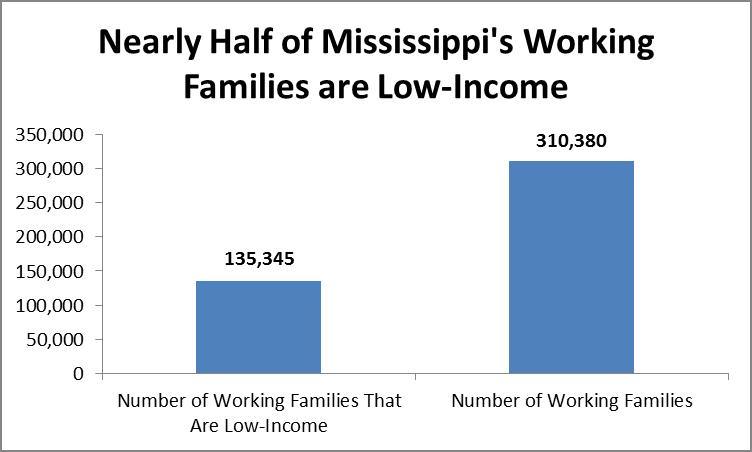Long overlooked, Mississippi’s high school and dropout population is a potential resource that has largely not been harnessed. One in six adults in Mississippi do not have a high school diploma/GED. The low wage, low skill occupations offered to this demographic does not offer economic security. This lack of economic security ultimately causes families to need public assistance, which carries high costs for the state. As the chart shows nearly 50 percent of Mississippi’s working families are low-income, defined as those families earning less than 200% of the poverty rate.
Often times, these adults decide to pursue education in order to increase their earning potential, career trajectory, and life outcomes. Unfortunately, however, they face barriers to achieving an education, particularly with the cost of attendance. Adults with families, for instance, have much higher costs associated with pursuing an education, such as child care. These students are often making the grade, but are unable to finish due to lack of support.
Adults are also not eligible for Mississippi’s financial aid programs, and typically do not have other sources of revenue to assist in paying for their study. Therefore, adults are more vulnerable to financial challenges that arise during their education, and often do not finish their course of study as a result.
Mississippi’s economic advancement is dependent on integrating this traditionally marginalized group via post-secondary education. Financial aid is important for post-secondary completion. It is without doubt, then, that financial aid and the supports that impact a student’s persistence are an important aspect for ensuring credential completion.
Over the following weeks, I will be highlighting some of MEPC’s recommendations regarding improvement of financial aid within Mississippi. A common theme of the recommendations includes removing barriers for adult learners seeking to pursue education. Only after the barriers are removed will Mississippi truly realize the potential of this group through higher employment and productivity.







